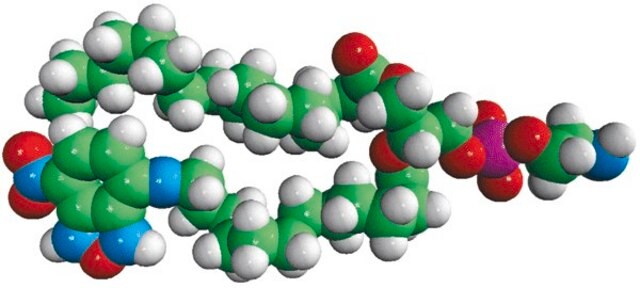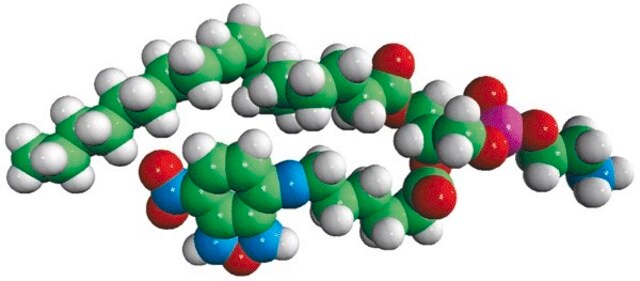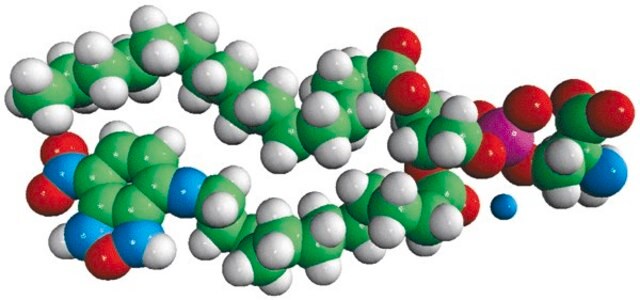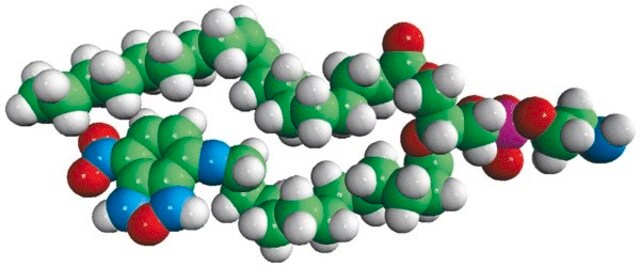810175P
Avanti
18:1-06:0 NBD PA
Avanti Research™ - A Croda Brand
Synonym(s):
1-oleoyl-2-{6-[(7-nitro-2-1,3-benzoxadiazol-4-yl)amino]hexanoyl}-sn-glycero-3-phosphate (ammonium salt)
Sign Into View Organizational & Contract Pricing
All Photos(2)
About This Item
Empirical Formula (Hill Notation):
C33H56N5O11P
CAS Number:
Molecular Weight:
729.80
UNSPSC Code:
12352211
NACRES:
NA.25
Recommended Products
Assay
>99% (TLC)
form
powder
packaging
pkg of 5 × 2 mg (810175P-10mg)
manufacturer/tradename
Avanti Research™ - A Croda Brand
shipped in
dry ice
storage temp.
−20°C
General description
Phosphatidic acid (PA) is an amphipathic lipid containing a polar head group and two long hydrophobic acyl chains. PA is an anionic and a membrane structural lipid. It acts as a parent compound for more complex membrane phospholipids.
Application
18:1-06:0 NBD PA may be used for study the effects of NBD-PA induced vesiculation on epidermal growth factor receptor (EGFR) endocytosis in mammalian cells and the co-localization of fluorescently-labeled poly(A)-specific ribonuclease (PARN) with the NBD-tagged PA that outlines the close proximity phospholipase D (PLD2) and PARN.
Biochem/physiol Actions
Phosphatidic acid (PA) is a bioactive lipid and a secondary messenger. PA reacts with water and other phospholipids to produce lipid bilayers and multicomponent bilayers respectively.
Packaging
5 mL Amber Glass Screw Cap Vial (810175P-10mg)
Legal Information
Avanti Research is a trademark of Avanti Polar Lipids, LLC
Storage Class Code
11 - Combustible Solids
Certificates of Analysis (COA)
Search for Certificates of Analysis (COA) by entering the products Lot/Batch Number. Lot and Batch Numbers can be found on a product’s label following the words ‘Lot’ or ‘Batch’.
Already Own This Product?
Find documentation for the products that you have recently purchased in the Document Library.
Lipid second messengers and Receptors
Encyclopedia of Endocrine Diseases, 77(3), 329-334 (2004)
Bioactive Lipids
An Introduction to Biological Membranes, ,
number=(,
pages=), 453-478 (2016)
Taylor E Miller et al.
Biology open, 6(2), 176-186 (2016-12-25)
The removal of mRNA transcript poly(A) tails by 3'→5' exonucleases is the rate-limiting step in mRNA decay in eukaryotes. Known cellular deadenylases are the CCR4-NOT and PAN complexes, and poly(A)-specific ribonuclease (PARN). The physiological roles and regulation for PARN is
A Chauhan et al.
Neurochemical research, 25(3), 423-429 (2000-04-13)
Fibrillar amyloid beta-protein (Abeta) is the major protein of amyloid plaques in the brains of patients with Alzheimer's disease (AD). The mechanism by which normally produced soluble Abeta gets fibrillized in AD is not clear. We studied the effect of
Karen M Henkels et al.
Oncotarget, 7(30), 47002-47017 (2016-06-04)
The intracellular concentration of the mitogen phosphatidic acid (PA) must be maintained at low levels until the need arises for cell proliferation. How temporal and spatial trafficking of PA affects its target proteins in the different cellular compartments is not
Our team of scientists has experience in all areas of research including Life Science, Material Science, Chemical Synthesis, Chromatography, Analytical and many others.
Contact Technical Service







